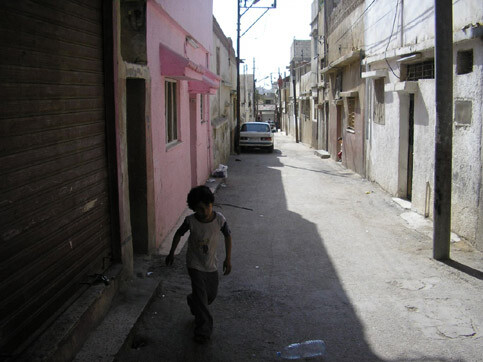IRIN 28 August 2005

Jordan has the largest concentration of Palestinian refugees, with nearly two million in 13 camps. (Arjan El Fassed)
AMMAN (IRIN) — The United Nations Relief and Works Agency for Palestine refugees (UNRWA) expects to complete one of the most comprehensive studies on the declining living conditions of over four million refugees, by the end of the year, according to UN sources.
The first phase of the survey has already been launched in the countries where the UN agency operates in such as Jordan, Lebanon, Syria and the Occupied Palestinian Territories. It will be critical in assessing how to improve heavily stretched services, UNRWA officials said.
The survey is a product of a major donors meeting in Geneva last February where UNRWA, which is by far the largest UN operation in the Middle East, sought ways to assess the “real needs of refugees”, according to Matar Saqer, an UNRWA spokesperson.
The analysis of the survey’s findings will be undertaken by researchers in the Belgian UCL Universite Catholique de Louvain and Geneva University which have been commissioned to undertake the study.
Saqer told IRIN that UNRWA had argued, during the February donors meeting in Geneva, that its resources have not kept pace with the growing needs of refugees. The refugees were slipping backwards in comparison with non-refugees they live among, he explained.
The findings will help in fine tuning a five-year blue-print plan by UNRWA that was presented to donors requesting an estimated US $1.1 billion in extra funding to help improve life chances of refugees and enhance their ability to support themselves.
UNRWA officials say the findings will help to identify more clearly the needs and areas to improve the UN agency’s humanitarian services for Palestinian refugees in the fields of health, education and basic infrastructure.
UNRWA was set up to help Palestinian refugees from the 1948 Arab-Israeli war. Their numbers grew after the 1967 war and the agency now tries to care for 4.1 million refugees in Syria, Lebanon, Jordan, the West Bank and Gaza Strip.
One-third of the registered Palestinian refugees, about 1.3 million, live in 59 recognised refugee camps in the agency’s area of operations.
In Jordan, which hosts the largest number of UN-registered refugees, over 100 independent field researchers helped by 70 UNRWA employees, have taken a sample of 2,600 refugees across the kingdom where only 18 percent live in camps.
“We have completed the samples on Thursday,” said Oraib Rantawi, director of al-Quds Centre for Political Studies, the local Jordanian partner assigned to data entry.
The 70 question survey, which according to some independent experts is one of the most comprehensive surveys ever conducted, depends on field interviews without official monitoring, Rantawi said.
The questionnaire did not include any content of a sensitive political nature that touch on political aspirations or “right to return” for refugees and millions of their descendents - that is a core Palestinian demand, he explained.
In Jordan’s case, the authorities — as in other host Arab governments — have long been sensitive about the political repercussions of the Palestinian refugee presence in their countries.
Officials told IRIN their consent to conducting the exhaustive survey comes after the relevant authorities verified that the questions were free of political connotations and focused on asking about refugees’ humanitarian needs.
“We discussed the questionnaire with different government agencies to examine its content to make sure the goals of the questionnaire were about the services that are given by UNRWA in the social and economic field,” said Wajeeh Azayzeh, head of the Palestinian Affairs department, a Jordanian government agency that oversees UNRWA’s operations in the kingdom.
Education and health facilities for Palestinian refugees are often overcrowded and under equipped and their homes are in dilapidated conditions, according to observers.
This Item is Delivered to the “Africa-English” Service of the UN’s IRIN humanitarian information unit, but may not necessarily reflect the views of the United Nations. For further information, free subscriptions, or to change your keywords, contact e-mail: irin@ocha.unon.org or Web: www.irinnews.org. If you re-print, copy, archive or re-post this item, please retain this credit and disclaimer. Reposting by commercial sites requires written IRIN permission.
Related Links